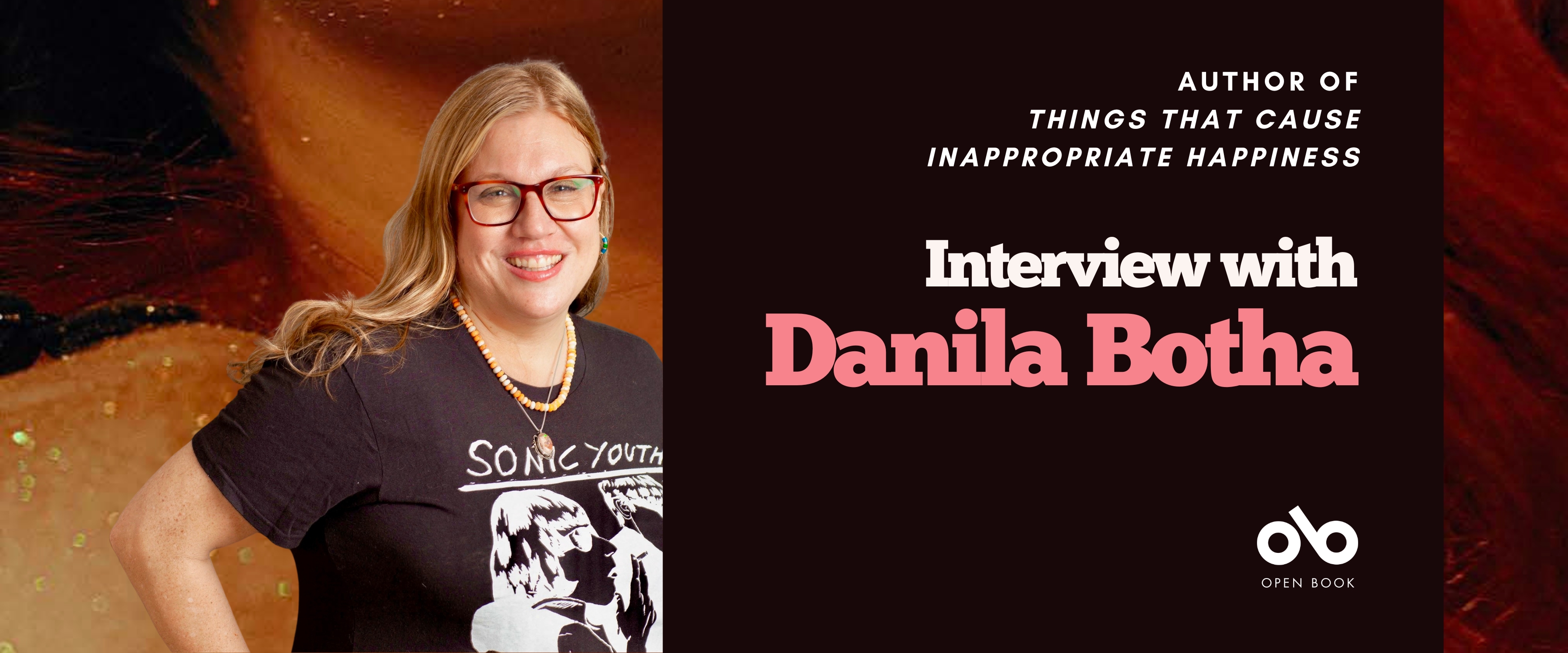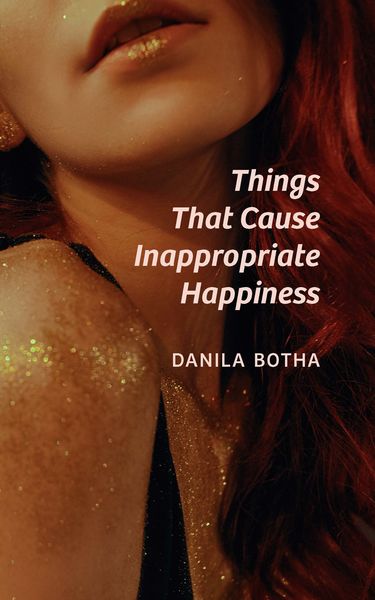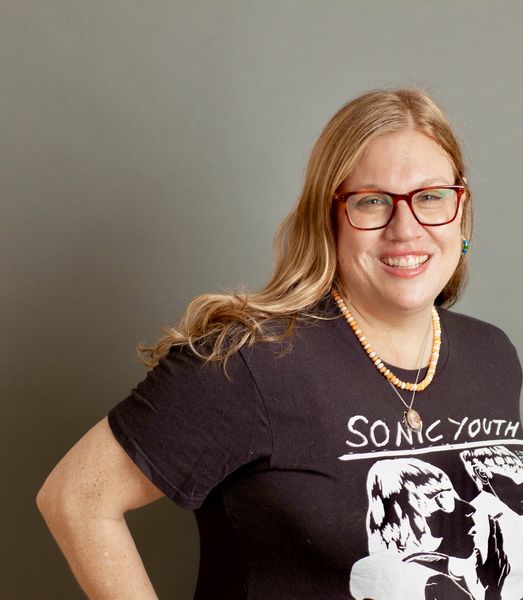Danila Botha's New Short Story Collection Makes Us Laugh, Cry, and Feel Less Alone
The best short story writers often show an unmatched precision in their work, finding ways to illuminate truths about the world with economy and elegance. They carefully observe the characters, places, and moments that will bring their stories to life on the page, and then make them all real for the reader.
Prolific and profound, Danila Botha is an author of short fiction (amongst other forms) who always looks deeply into the hearts and minds of her characters. In her latest short fiction collection, Things That Cause Inappropriate Happiness (Guernica Editions), she explores cultural and religious identity, displacement, and the way that we grow to depend on interpersonal relationships of all varieties.
The result is a collection of stories that shows vast range and depth, and one that is illuminated further when we delve into Botha's writing process, and the sources of inspiration that keep drawing her back to short fiction.
We're thrilled to share all of this and more as Botha takes on this Keep it Short interview, Open Book's featured series for short story authors.
Open Book:
How did you decide what stories to include in the collection? When were they written?
Danila Botha:
That’s a great question. Originally, when I first put the collection together, I’d written about eighteen stories, and by the time we were done, there were thirty- two. Even I was surprised by the volume and I’m immensely grateful my editor and publisher, Michael Mirolla for being so supportive of the stories and patient with the whole process. He was amazing to work with.
I write short fiction a lot, even if I’m not working on a particular project. The oldest story was the first story in the collection, Sometimes I Like to Shoot Kids. Once I’d written it, I had a sense of the tone and style for the collection. I think I wrote it four years ago. All Good Things Take Time, which was originally an extra chapter in my upcoming novel is also about that age. I got wonderful early manuscript feedback from the author Elyse Friedman, to take it out- and she recommended repurposing it as short fiction. I generally keep discarded stuff in a scraps folder on my desk, in case it’s possible to use them elsewhere, and I’m so happy that this worked.
The other stories were written much more recently, in the last year or two.
OB:
What do the stories have in common? Do you see a link between them, either structurally or thematically?
Your CanLit News
Subscribe to Open Book’s newsletter to get local book events, literary content, writing tips, and more in your inbox
DB:
I wasn’t completely conscious of it as I wrote, but the theme of identity and displacement, and cultural and religious identity came up a lot. I also realized that I had a lot of characters whose identity was heavily dependent on relationships (romantic and platonic, family relationships too) which was really interesting.
I didn’t plan to write a collection focusing on Jewish identity, but once I started I realized I had so many more stories that I wanted to tell. For example, in Soulmates, a young woman who is raised Orthodox discovers that she’s in love with her female best friend, and she struggles to reconcile that with her upbringing and then with who she is and where she belongs. In Able to Pass, an artist builds a golem when she learns of her Holocaust surviving grandmother’s wish, and it changes the structure of her whole family. I also thought about Jewish icons, like Anne Frank, who I imagined as an adult in Like An Alligator Eyeing a Small Fish, (she was such a talented writer, but it must be so strange to be defined by such a specific period in one’s life, frozen at a specific age, especially when you consider what she experienced after, and all that she could have written and experienced)
In the title story, Things that Cause Inappropriate Happiness, I wrote about Leonard Cohen, whose writing and music I’ve always loved so much. There was always something so pure and transcendent about his work. I hope I captured that.
I also realized, after an amazing conversation with the incredibly talented Leesa Dean, that I love to write complicated women in difficult situations, and I think there’s a lot of that here.
OB:
How did you decide which story would be the title story of your collection? Why that story in particular?
DB:
The title is usually the first thing I figure out, because once you have one, the project starts to feel real, and themes start emerging. But this time, for the longest time, I couldn’t decide.
Sometimes I like to Shoot Kids (which is a story about a photographer) felt too controversial. I thought about it naming it after the last story in the collection, There’s Something I’ve Been Meaning to Say to You, which was set during the pandemic, and imagined a person with a chronicle illness writing public messages about their complicated feelings during lockdown. It was pointed out to me though, by a wonderful editor friend, that as a title for a collection, it sounded really similar to some others, which when I checked, was definitely true.
The story Things that Cause Inappropriate Happiness was written last and was a really meaningful story to me. The title comes bizarrely from a real side effect of Prednisone, which unfortunately I know all about it. Like the main character, Lielle, I have rheumatoid arthritis, and I had to grapple with how it affected my sense of self, as a writer and an artist and as a person. The story is a work of fiction, she worked in the art world, and is working as a substitute art teacher, but it felt so cathartic to write about what it’s like to have RA. It was also fun to write the flashback to the 90’s, I had recently read and love Emma Straub’s This Time Tomorrow. (and it’s always great to find a way to bring in Leonard Cohen) I really enjoyed writing it.
OB:
Do you think your characters have anything in common with each other, from story to story?
DB:
I think so. I love writing about women who make unexpected choices, or have to reconcile what they want or who they are with societal expectations.
When I wrote stories like Always An Angel, Never A God, or The Best Guy I’ve Ever Known, which are both about women who chose to stay with their partners and defend the indefensible, I wanted to explore internalized misogyny. I started to do that in my last collection, with Wolf Eyes, in For All the Men (and Some of the Women) I’ve Known, and it was interesting to be able to explore it in more depth. It’s been really hard to understand and reconcile with the backlash against #MeToo, for example but I wanted to try.
It’s also interesting to write about subjects from both points of view, for example writing about a character being bullied in Born, Not Made, and a character doing the bullying in When You Play with Fire. Or to write about pregnancy loss in Aloha State, and someone who fakes a pregnancy and a loss in All Good Things Take Time. The contrasts were really interesting, and the similarities were surprising.
OB:
What do you enjoy most about writing short fiction? What is the toughest part?
DB:
I really love all of it, from sketching out ideas to editing it. I love the economy of the form, the tightness of trying to get everything in, the minimalism, the fact that you have establish character and voice so quickly. I love it on a craft level, and I love it in terms of form and style. There’s also so much amazing short fiction out there, if I’m struggling to write day, I always get inspired when I read.
OB:
Did you do any specific research for any of your stories? Tell us a bit about that process.
DB:
I do the usual things: I interview people and lurk on internet forums and collect stories and experiences and turns of phrase. I also read as much as I can about anything related to the subject. For example, in Dark and Lilac Fairies, I researched ballet, I researched Hungarian terms, and I read about the Polish Jewish ballerina Franceska Mann, who killed a Nazi guard and wounded another before being killed herself. The grandmother’s sister was inspired by her incredible story.
With Proteksiye and Mazel, I read the surviving diary of Ilya Garber, a teenage artist who was living in the Kovno Ghetto in Lithuania. It was part of this amazing collection of diaries that were found after the Holocaust, called Salvaged Pages, edited by Alexandra Zapruder.
I was so touched by his story, his unique perspective and his artistic sensibilities, I felt like I had to write about him. As far as I know, no one in his family survived, but I wanted him to have a sibling who managed to escape to keep his memory alive. I read a lot of books, including one with pictures of the ghetto including the temporary beach, I consulted friends who are Holocaust scholars, and used the online databases of USHMM and Yad Vashem.
OB:
What was the strangest or most memorable moment or experience during the writing process for you?
DB:
In Black Market Encounters, the midwife who met her husband while he was married to someone else (and she was delivering their baby) was based on a real story I’d heard. I couldn’t get it out of my mind, I kept wondering how in the world both parties could have justified it to themselves. The research process for all of it was fascinating.
In All Good Things Take Time, researching faking and then terminating a fake pregnancy was wild. The story was also set in New York, so I had to research the city itself, in addition to Munchausen’s.
OB:
Do you have a favourite short story collection that you've read? Tell us why it is special to you. What story collections were you reading for inspiration while writing your book? What did you learn from them?
DB:
All of Etgar Keret’s short stories and collections are really special to me. I love the way he writes, the imagination, the tightness of the language, the unexpected moments of vulnerability, the humour. Nathan Englander too, he’s such a master of the form and of piercing insights. I love Heather O’Neill’s short story collection so much too. Her descriptions and metaphors are indescribably beautiful. I also love her characterization. When I was writing this collection, I read Vilna My Vilna by the Jewish Lithuanian writer Abraham Karpinowitz, and I had to sleep with it on my bedside table every night. It was the same with Chava Rosenfarb, her collection Survivors, especially the story Edgia’s Revenge was life changing. Her writing was so beautiful and emotionally acute and risk-taking, in every sense. I also reread a lot Cynthia Ozick.
I also love and reread the classics: Margaret Atwood’s short stories, especially Dancing Girls, Bluebird’s Egg, and Wilderness Tips, they’re all just so precise and perfectly crafted and her characterization and descriptions are so sharp and amazing. Alice Munro, all of her collections, at the moment It’s The Love of a Good Woman and Open Secrets. Grace Paley. Lucia Berlin. Cheever and Carver and Denis Johnson. Chekhov. David Bezmozgis. Lorrie Moore. Jhumpa Lahiri. Carleigh Baker. Rebecca Rosenblum. Ayelet Tsabari. Kathy Friedman. Leesa Dean. Michael Christie. Shashi Bhat. Lynn Coady. Lisa Moore. Neil Smith. Anosh Irani. Tea Mutonji. Zalika Reid-Benta. Souvankham Thammavongsa. Jess Taylor. Sydney Hegele. paulo da costa. Susan Sanford Blades. I’ve also read and am reading some absolutely incredible recent collections that I can’t wait to talk about in the future.
OB:
Did you celebrate finishing your final draft or any other milestones during the writing process? If so, how?
DB:
I should have. I was sad when we finished the final edits, I loved the process of writing this book so much. I’m excited for the launch in April.
OB:
Who did you dedicate your collection to, and why?
DB:
I actually didn’t, though my acknowledgement section is long. I would have dedicated to my amazing husband, Micah, and our amazing kids.
OB:
What if, anything, did you learn from writing these stories?
DB:
I hope I’m always learning and growing as a writer. I hope I’m always taking more risks, and that I always have empathy and compassion for my characters.
_________________________________________________
Danila Botha is the critically acclaimed author of short story collections Got No Secrets and the Trillium Book Award, Vine Awards, and ReLit Awards finalist For All the Men (and Some of the Women I've Known.) Her award winning novel Too Much on the Inside was published in 2015. It was optioned for film by Pelee Entertainment in 2023. She is currently working on her new graphic novel, and has a new collection of short stories, and a new novel coming out soon with Guernica Editions.







